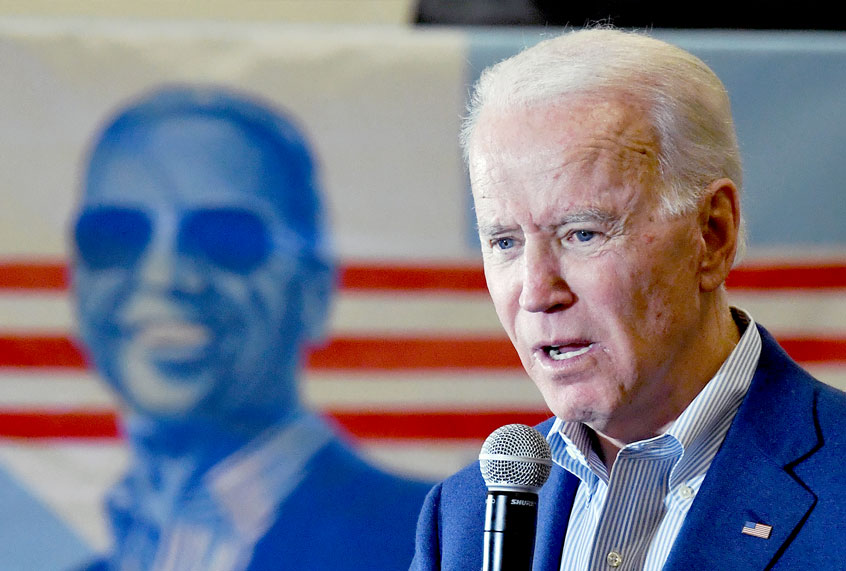Former Vice President Joe Biden’s campaign has admitted he was not arrested while trying to visit former South African President Nelson Mandela. He has told this false story multiple times on the campaign trail in recent weeks.
Biden was “separated” from black colleagues he was traveling with during a congressional trip to South Africa in the 1970s but was never “arrested,” Biden communications director Kate Bedingfield said after Tuesday’s debate in South Carolina. As the New York Times observed in a Tuesday article, this account “left many questions unanswered and did not square with Mr. Biden’s most recent remarks.”
Biden recently began telling the story at campaign events despite apparently never having mentioned it before. The claim quickly raised suspicions, since Biden had not mentioned any such incident while discussing his South Africa trip in his memoir and in past speeches.
“This day, 30 years ago, Nelson Mandela walked out of prison and entered into discussions about apartheid. I had the great honor of meeting him. I had the great honor of being arrested with our UN ambassador on the streets of Soweto trying to get to see him on Robben Island,” Biden claimed during an event in Columbia, South Carolina, on Feb. 11. This anecdote was puzzling from the outset, since Robben Island, where Mandela was imprisoned at the time, is more than 700 miles from Soweto.
Biden told a different version at a Las Vegas event on Feb. 16.
“After he [Mandela] got free and became president, he came to Washington and came to my office. He threw his arms around me and said, ‘I want to say thank you.’ I said, ‘What are you thanking me for, Mr. President?’ He said: ‘You tried to see me. You got arrested trying to see me,'” Biden claimed.
The claim, which is reminiscent of former Secretary of State Hillary Clinton’s false claim during the 2008 campaign that she arrived in Bosnia “under sniper fire” as first lady, quickly fell apart under scrutiny.
Biden, who was a staunch opponent of apartheid, claimed that he was arrested along with the U.S. ambassador to the UN, a position held at the time by former Atlanta Mayor Andrew Young.
“There is no chance I ever was arrested in South Africa, and I don’t think Joe was, either,” Young told The Washington Post.
Young told the Post that he took three trips to South Africa with Biden. On one such trip, Young said, “[W]e were not jailed, but we were retained by South Africa police” while trying to get back to a military base in nearby Lesotho. He said former Rep. Charles Rangel, D-N.Y., got “pretty worked up about it” but the incident was quickly sorted out.
Biden had a different recollection of his later conservation with Mandela when he discussed it in 2013.
“We went to meet with some anti-apartheid supporters in South Africa, mostly the English business community at the time,” Biden told reporters. “We spent several days in South Africa. Obviously, no one [was] able to see him on Robben Island, but making our case. And after he got elected president, he came to see me because I was on the [Senate] Foreign Relations Committee, and thanked me, along with everyone else who had gone on that trip, for supporting sanctions against apartheid.”
His 2007 memoir “Promises to Keep” also discussed the South Africa trip but did not mention any arrest.
Biden’s campaign ignored reporters’ questions on the issue for days, before finally acknowledging that his account was untrue.
“He was separated from the [Congressional Black Caucus] members he was traveling with at the airport, when he landed,” Bedingfield said on Tuesday. “It was a separation. He was not allowed to go through the same door as the rest of the party he was with. Obviously, this was apartheid South Africa. There was a white door. There was a black door. He did not want to go through the white door, and have the rest of the party go to the black door. He was separated.”
Bedingfield’s version of events aligns with Biden’s past statements.
“When I exited the plane, I was directed to one side of the tarmac, while the African American congressmen traveling with me were sent to the other side,” Biden said in a statement after Mandela’s death in 2013. “I refused to break off, and the officials finally relented.”
But Washington Post fact-checker Glenn Kessler pointed out that even that explanation may not stand up to scrutiny.
“Congressional delegations at the time did not land in South Africa but in Lesotho,” Kessler wrote, a black-ruled kingdom entirely surrounded by South Africa that gained independence in 1966. There would have been no apartheid-style rules at any airport in Lesotho.

